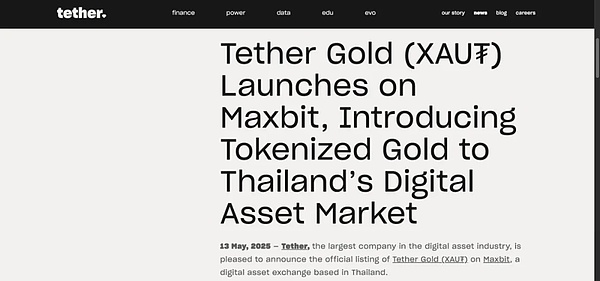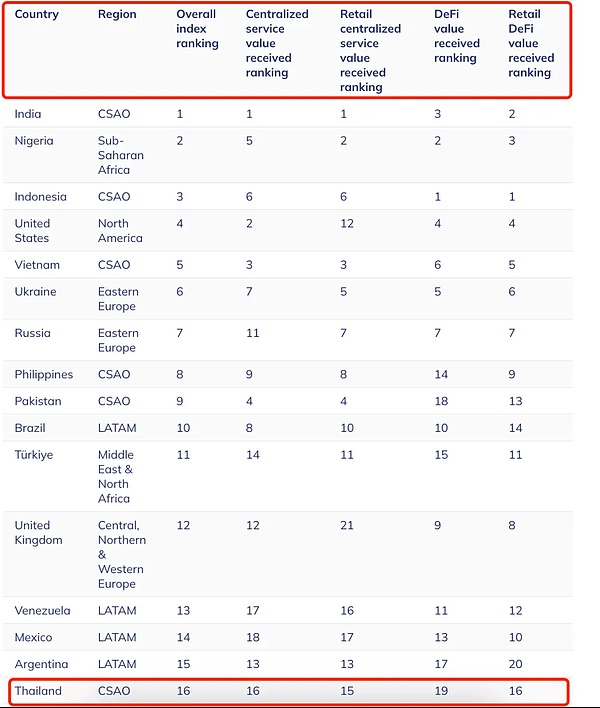On May 13, 2025, Tether, the issuer of the stablecoin USDT, announced that it would list Tether gold tokens (XAU₮) on Maxbit, a Thai digital asset exchange. According to Tether, 1 XAU₮ corresponds to 1 ounce of gold in the real world.
Prior to this, on March 10, 2025, the Thai Securities Regulatory Commission (SEC) announced that USDT was a recognized cryptocurrency, and the Thai Deputy Prime Minister also announced that Thailand intended to use cryptocurrency and blockchain technology to promote the development of local tourism.

Figure 1 Tether officially announced that gold tokens have officially entered Thailand
Earlier, on December 7, 2023, Tether announced that it would cooperate with Bitkub, the largest cryptocurrency exchange in Thailand, to launch an educational project on stablecoins and blockchain knowledge in Thailand. The two parties will enhance Thai users' digital financial awareness by setting up educational courses, general education campaigns, motivational learning programs and question-and-answer programs. It is worth noting that USDT is also the most traded stablecoin by Thai users and Bitkub exchange.
Tether, the issuer of the world's largest stablecoin USDT, showed in its latest first quarter 2025 financial report that as of March 31, the market value of stablecoins issued by Tether was about 143.7 billion US dollars, the scale of US Treasury bonds held was about 120 billion US dollars, and the new supply of USDT in the first quarter was about 7 billion US dollars, and 46 million new user wallets were added.
Even though it is the number one stablecoin, Tether has been embracing regulation in recent years, hoping to gain more regulatory endorsements and market share. On January 13 this year, after obtaining the Digital Asset Service Provider License (DASP) issued by El Salvador, Tether announced that it would move its headquarters and related entities from the British Virgin Islands (BVI) to the Central American island country of El Salvador. The company's CEO and COO also purchased real estate in the local area and obtained local resident status.
Thailand, one of the most active economies in Southeast Asia, is a world-famous tourist destination with an export-oriented economy and frequent cross-border capital and personnel flows. Under the influence of various factors, the Thai government's policy on digital assets is also quite friendly, attracting many industry giants and start-ups to choose to engage in crypto asset business in Thailand. In a global cryptocurrency adoption index country ranking published by Chainalysis in 2024, Thailand ranked 16th on the list.

Figure 2 Chainalysis announces the ranking of cryptocurrency adoption index in 2024
This article will take Tether's strategic layout in Thailand as the starting point to summarize the characteristics of the Thai market for digital asset regulation.
Thailand's regulatory attitude towards digital assets
Thailand's regulatory attitude towards crypto assets has undergone a transformation from cautious observation to active embrace. This evolution is closely related to the development trend of the global digital economy and the adjustment of Thailand's domestic economic strategy.
On May 14, 2018, Thailand promulgated the "Digital Asset Business Act" to divide digital assets into two categories: cryptocurrency and digital tokens. The main difference between the two is that cryptocurrency is a medium of exchange, and digital tokens are a representation of rights and interests. At the same time, the decree mainly regulates crypto assets from two dimensions: one is the issuance of digital tokens, and the other is the development of digital asset businesses, including exchanges, market makers, service providers, fund managers, investment advisors, and custodial wallet service providers.
Thailand's regulation on token issuance
1. Regulated token issuance: Investment tokens, utility tokens ready to be listed on exchanges, and cryptocurrencies.
Depending on the source of income, the Securities and Futures Commission of Thailand divides digital tokens into real estate digital tokens, infrastructure digital tokens, sustainable development-related digital tokens, debt tokens, etc. In 2022, real estate company SC Asset raised about 300 million baht (about 8 million US dollars) through STO, becoming the first approved case.
If investors want to issue regulated tokens, they need to meet the following conditions:
Obtain permission from the Securities and Exchange Commission of Thailand;
Submit a registration application to the Securities and Exchange Commission of Thailand for the issuance of digital tokens, and submit a prospectus for the issuance of tokens;
Meet the qualifications required by regulators.
2. Token issuance exempted from regulation:Digital tokens issued by the Bank of Thailand (BOT), consumer-oriented utility tokens, and limited offerings that meet specific conditions.
Consumption-oriented utility tokens:
The issuer issues tokens for consumption purposes or as digital certificates;
Utility tokens that are not for consumption purposes or as digital certificates, but are limited to use in specific distributed ledger systems, such as tokens used within centralized finance CeFi and decentralized finance DeFi, tokens used as discounts or other subsidies in licensed digital exchanges, and tokens representing voting rights.
Limited issuance by the issuer that meets the SEC's information disclosure requirements for investors and meets one of the following specific conditions:
Issued to institutional investors or ultra-high net worth clients;
Targeted at specific investors with a special relationship with the issuer, the issuance period shall not exceed 12 months, and the number of specific investors shall not exceed 50;
The issuance period shall not exceed 12 months, and the total issuance value shall not exceed 20 million baht.
Thailand's regulation of digital asset exchanges
Scope of regulated digital asset exchanges: Centers or networks that provide services for buying, selling, and matching digital assets.
Conditions that must be met for digital asset exchanges:
1. An entity registered in Thailand and obtained a license issued by the Thai Ministry of Finance;
2. The exchange shall not engage in digital asset trading business;
3. The paid-in registered capital shall not be less than 100 million baht;
4. Maintain the net asset level required by the regulator;
5. Comply with the anti-money laundering and anti-terrorist financing regulations required by the regulator;
6. Fulfill the obligations of KYC, CDD and timely reporting of suspicious transactions.
Attorney Mankiw recommends
1. To conduct token issuance business in Thailand, a company entity must be registered in Thailand, and the license of the Securities and Futures Commission of Thailand must be evaluated based on the characteristics of the token;
2. The company's management, such as directors, executive directors, and other managers, cannot have a bankruptcy or criminal record;
3. The company should at least have a reliable business plan and audited financial statements;
4. The company should pay attention to timely disclosure of the company's operating and financial data in accordance with SEC requirements.
 Anais
Anais



